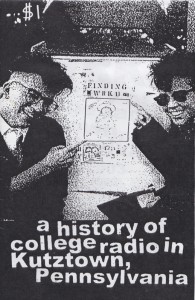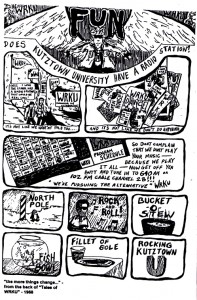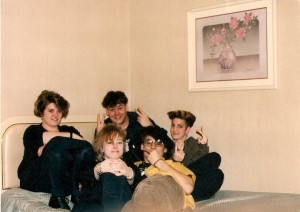I’m a college radio history buff, so whenever I run across someone who has taken the time to document the early history of a college radio station I am beyond impressed.
Lew Houston, formerly of WRKU radio at Kutztown University (now known as KUR radio), researched, compiled and wrote, “Finding WRKU: A History of College Radio in Kutztown, Pennsylvania 1948-2003” in order to capture tales of the station’s past before they were lost in the ether. He chronicles the experiences of students at Kutztown University, from the formation of a radio club in 1948 to the birth of their first college radio station WKSC in 1967 (using AM carrier current), to their attempts to get on FM, to call letter changes (to WRKU in 1984 and to WKUR around 2001), to ongoing debates over the music format of the station.
I’ve seen similar station histories before, including the book about radio at Beloit College written by another Radio Obsessive Dave De Anguera, but I’d never seen anything quite like Lew Houston’s tome. “Finding WRKU” is a ‘zine style black and white photocopied booklet with a few staples down its spine. Originally available for $1, the booklet captures the same aesthetic that many of us remember from our college radio days in the pre-Internet 1980s and 1990s.
It’s a fitting format, as WRKU DJs published zines (“Tales of WRKU” and “Pop Schmear”) for 7 years starting in 1988. Lew writes, “In the late ’80s WRKU had a staff made up of punk and hardcore kids, indie rockers and outcasts who were in love with the underground and its do it yourself cry. They’d already made meager attempts at spreading the word through the airwaves…The next logical step was printed media.”
In Lew’s history of the station he includes photocopies of images from some of these long-forgotten ‘zines, as well as photos of former DJs, and press clippings. As he writes in his booklet, “I spent hours in Rohrbach peering at microfilm. Days really. I was there so much my friends started stopping by to say hello. I was buried in the upper corner of the library where no living beings dwell and still I could get no peace and quiet. So much for hiding. Or keeping a secret. They would ask why I was wasting so much time looking at microfilm. I’d tell them I was researching the campus radio station. They’d have no idea it ever existed. I’d resume my task with renewed vigor.”
I’ve SO been there and thank Lew Houston for taking the time to preserve tidbits from WRKU’s past, as we all benefit from it. His station history reminds us all of the struggles that many college radio stations have had. He writes, “…the station was always jumping through hoops, on the verge of falling apart, attempting to gain student support, dealing with hassles from the administration, and not making very much progress. There were several years of growth, popularity, and success but these were always punctuated with years of inactivity and decline.” These words could easily have been written about the station where I dj’d in college, so I found Lew’s booklet to be a fascinating and familiar read.
Thanks so much to Lew for answering some questions over email about how he came to research the history of radio at Kutztown University. I’m also very grateful that he sent me my very own copy of “Finding WRKU.” It’s amazing that I even found out about the booklet in the first place while doing my own research on college radio history. Today radio lives on at Kutztown University, in the form of radio station KUR, which broadcasts terrestrially over low power AM and FM, over the Internet, and on local cable outlets.
Jennifer Waits: When were you involved with radio at Kutztown University?
Lew Houston: I was on the staff as a freshman starting in the Fall of 1999 through Spring 2000. I then took a break from the station until Fall 2001 and was involved with the station until graduating in Spring of 2003.
Jennifer: What prompted you to write up a history of radio on campus?
Lew: When I was involved in the station I spent a lot of time digging through the collected detritus of years past and came across a stack of cut and pasted originals for the WRKU Zines: ‘Tales of WRKU’ and ‘Pop Schmear’ which dated from 1988 through the early ’90s. They were the station’s attempt to give itself more identity and I found the little snippets of historical records in them really intriguing. Plus, I had been publishing my own zine since I was in high school so there was a greater connection to those types of documents for me. I couldn’t help but feel that the originals, which were practically falling apart, deserved to be re-photocopied and shared with the current student body, however after picking through them I realized that a lot of the content didn’t hold up over time. Still there were bits and pieces that I really wanted to preserve. I then realized they would be a great lead off to a broader history of the station from its inception to the then current day.
Jennifer: Tell me about the methods you used to piece together the history of radio at Kutztown from 1948 to 2003. Was it difficult to find out about the station’s history?
Lew: I started with those zines and my own personal involvement as well as the vague history of the station in the early to late ’90s that I had gleaned from older members of the staff. But, the majority of my research was done in the library doubled over the microfilm machine scanning through the student newspaper beginning with 1948, the year the first Radio Club formed in Kutztown and scanning it page by page all the way up to 2003, the year I began working on the project. Sadly, there was a large chunk of the newspaper missing from the ’70s but I still managed to find lots and lots of articles and letters to the editor, etc. throughout that 50 year span that allowed me to piece together a somewhat coherent history of the station. It would have been great to get the story straight from the mouths of the staff but I had no means to travel and wasn’t trying to get involved in a large scale project. For photographs I also relied on the University yearbooks which tended to have staff group photos as well as some candid shots of DJs while on air.
Jennifer: Having chronicled bits and pieces of the history of my own college radio station at Haverford, I could relate to your quote that: “The first headline devoted to college radio in Kutztown, Pennsylvania read: WKSC Goes on Air; Problems Abound. That was 1967. During the next thirty-six years very little would ever change.” Can you briefly explain why college radio has had so many challenges at your university?
Lew: Really it’s the same thing that plagues almost all student run organizations and that’s the high turnover rate. Every four years and sometimes every year, or even semester, the dynamics of the staff are changing. And as those with experience and wisdom in dealing with the university bureaucracy leave they often take their knowledge with them meaning that the staff practically has to start over from scratch in fighting the uphill battle for funds, respect, recognition, etc. Perhaps with a more stable staff they would have been able to get the funding necessary to get better equipment which would have lead to greater recognition and student/staff support, but it’s the old chicken and the egg and without the student/staff support there was never any leverage to get the funding.
Jennifer: How many different stations have existed at Kutztown? What were some of the high points/achievements of some of the stations on campus?
Lew: The original spark came from the Radio Forum, which was a radio enthusiasts club that began in 1948 before college radio was at all feasible. After that it was always one station, however the call letters changed from WKSC to WRKU and finally settled on WKUR which was shortened to KUR when the station switched to an online streaming format. It’s hard to list high points/achievements as it was always a sort of slow struggle, I would say the moments when funding was actually allocated and new equipment was purchased was always a highpoint. The station, although plagued with difficulties, did have some periods of stability in the ’70s and ’80s, it wasn’t really until the mid-’90s that things started slipping. And again a lot of those highs and lows are better outlined in the zine itself.
Jennifer: What was the role of the station on campus when you were there? Was it an active campus group known by most students? Where could the station be heard/seen?
Lew: When I joined the staff the station wasn’t broadcasting at all although we were making attempts to get back on the local cable station as the background music for community listings, etc. We maintained a small presence on campus by organizing live music events and DJing around campus but ultimately we were just a pack of radio/music obsessed weirdos sitting in the offices digging through LPs and bullshitting between classes.
Jennifer: Your history ends with the line, “As I type the station is still not on the air…” Can you tell me what happened to the station after your written history ended?
Lew: In the years directly after I left the station and Internet/digital radio became more popular and more affordable the station was able to acquire new equipment and a slightly larger presence on campus with streaming broadcasts. I have not kept in touch with anyone at the station but a quick Internet search revealed a website with this: “KUR is…available at certain times of the day as the audio simulcast on Berks County Service Electric TV Channel 24, Hometown Utilicom TV Channel 28, on I-Phones by searching for ‘Radiolicious’ and downloading the free app, and as a live feed on any telephone by calling (610)-465-7860.”
Jennifer: Your booklet is in a ‘zine format and I know that WRKU published ‘zines at one point. What’s similar about the ‘zine culture and the college radio scene back in those days before the Internet?
Lew: Well the similarity is that both gave a voice to the voiceless. Mainstream radio and magazines were pretty unreachable for the average music/media arts fan or upstart writer, however college radio, especially with open formats in the ’90s, allowed DJs to play music and express views that weren’t being played/expressed on mainstream radio. In a very similar way zines allowed writers to express views and share the love of music, art, etc. that wasn’t being exposed in mainstream magazines. There was a definite heyday in the late ’80s/early ’90s of college radio and zine culture that ran concurrently and often fed off of one another and it was the openness, malleability and underground nature of those formats that created this kindred spirit.
Jennifer: Did you continue with radio after you left Kutztown?
Lew: I did not, though I stayed involved in music, booking a few shows in Kutztown and then going on tour as a roadie for several years and finally ending up in Austin, TX playing music myself.
Jennifer: Do you follow news about Kutztown radio today? What’s the status of the station?
Lew: As I stated earlier, I really don’t follow the station these days. However they have a web presence here.
Jennifer: Anything else you’d like to share?
Lew: The zine is not in print any longer but if anyone really really wants a copy, they can email me at lewskerdu[at]gmaildotcom and I will do my best to Xerox them a copy and mail it out.
Previous Radio Obsessive Profiles:
#1: Garrett Wollman’s Radio Tower Quest
#2: Jose Fritz’s Arcane Radio Trivia
#3: Radio Sticker of the Day curator Greg Blouch
#4: Seattle Radio Theater founder Feliks Banel
#5: Herculodge’s Jeff McMahon – The Man Who Loved Radios Too Much
#6 & #7: Jonathan Winter and John Jenkins of American Museum of Radio and Electricity





